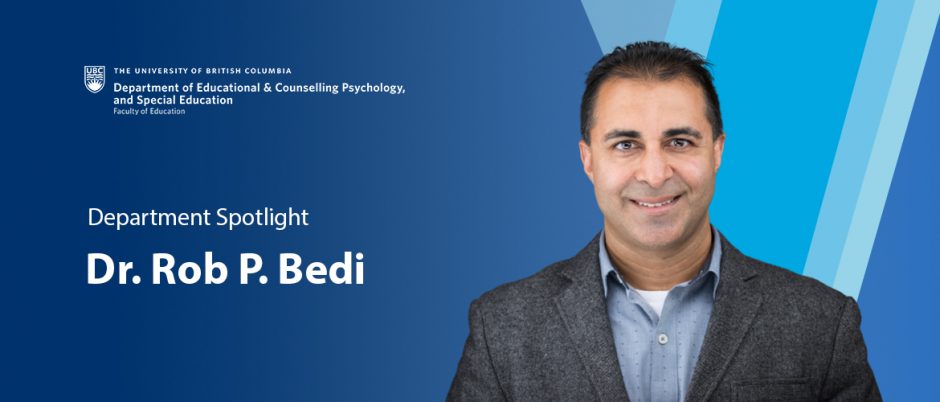April 6, 2023

Robinder P. Bedi is a Counselling Psychology Associate Professor with the UBC Department of Educational and Counselling Psychology, and Special Education. He is a registered psychologist in British Columbia with scholarly interest in International/cross-cultural/multicultural counselling and psychotherapy, and counselling/psychotherapy envisioned as Western cultural healing practices.
How long have you worked with the Faculty of Education, ECPS Department?
I have worked in the Department of ECPS (counselling psychology program area) since August 2015.
What’s your educational background and journey, and what brought you to UBC?
I started my postsecondary education at Simon Fraser University and completed my honour’s BA in psychology and MA in counselling psychology. I then completed my PhD in counselling psychology at UBC before heading off to a postdoctoral psychology residency in Chemical Dependency Services in the Department of Psychiatry at Kaiser Permanente Medical Center in San Rafael, CA. After one year there, I took up an academic position as an Assistant Professor in the Department of Educational Psychology and Leadership Studies (Counselling Psychology Program) before relocating to the Department of Psychology at Western Washington University in Bellingham, WA (Mental Health and School Counselling Programs). Soon after being promoted to Associate Professor at Western Washington University, I moved to the Department of ECPS at UBC in August 2015, where I joined as an Assistant Professor. I became an Associate Professor in July 2018.
I was attracted to UBC’s counselling psychology program because it offered the opportunity to work with PhD students, which were not available at my previous university and because I thought and continue to believe that it is the top/best counselling psychology program in Canada.
What inspired you to work in Educational and Counselling Psychology, and Special Education, specifically research/teaching?
I am a proud counselling psychologist and I seek to serve society through the production and dissemination of knowledge and perspectives related to counselling psychology. Although I maintain a very small private counselling psychology practice, I believe I can better effect society in a positive way by training the next generation of counsellors and counselling psychologists; and it is important to me that I help others achieve their potential and live satisfying lives.
What most excites you about your field of work?
Being able to implement the core Canadian counselling psychology values through research, practice, teaching, supervision and service:
1. Counselling psychologists view individuals as agents of their own change and regard an individual’s pre-existing strengths and resourcefulness and the therapeutic relationship as central mechanisms of change.
2. The counselling psychology approach to assessment, diagnosis, and case conceptualization is holistic and client-centred; and it directs attention to social context and culture when considering internal factors, individual differences, and familial/systemic influences.
3. The counselling process is pursued with sensitivity to diverse sociocultural factors unique to each individual.
Tell us about your work and recent project.
Currently, I am working on research and scholarship that conceptualizes and investigates counselling and psychotherapy as Western cultural healing practices, traditional to the Euro American West (i.e., imbued with Western morals, values, norms, conceptions of the self etc.). I propose that the extent to which an individual (of European cultural descent or not) does not endorse aspects of the Western culture manifest through psychotherapy will adversely affect the extent to which that person is likely to seek psychotherapy out during times of distress and should also impact the extent to which psychotherapy will be effective with that individual (Bedi, 2018). Therefore, I am quite scrutinizing of some attempts to export psychotherapy and other Western psychological treatments globally to non-Western countries, and to use them with certain groups of immigrants and refugees in Western countries, even if culturally-adapted. While some of these efforts are well-meaning and based on a frame of moral responsibility or social justice, what often gets overlooked is the contribution to ongoing coloniality, taking advantage of a colonial mentality or otherwise continuing intellectual colonization and promoting Western superiority (and Western psychology as universal and culture-free, while all other cultural psychologies are viewed as indigenous psychologies that are not highly generalizable).
What are your hobbies and interests outside of work?
Prior to the onset of the covid-19 pandemic, I was quite interested in kickboxing as a fitness activity and had just begun to co-instruct children’s classes. I do hope to return to that one day but right now my “hobby” and main interest outside of work is spending time with my toddler son, which I wish I could do even more of. Other than that, I currently do yoga 3-4x per week as rehabilitation and recovery from a motor vehicle accident. Once my body feels up to it, I do plan to return to kickboxing as an excellent fitness activity because it will allow me to efficiently work on cardiovascular fitness, strength, and flexibility with just one activity, which is important because of how little free time I see myself having.